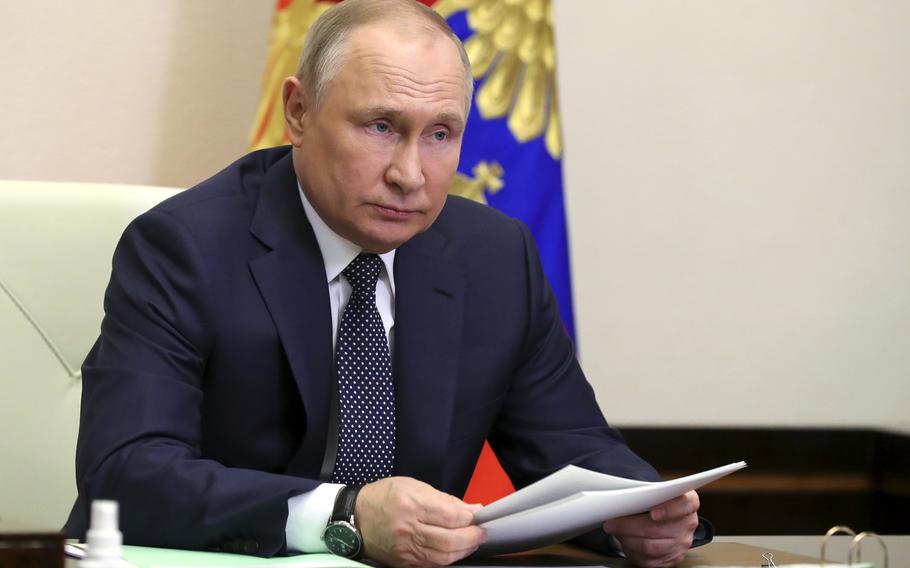
Russian President Vladimir Putin attends a meeting with top officials on support to aviation industry in Russia amid western sanctions vis videoconference at the Novo-Ogaryovo residence outside Moscow, Russia, Thursday, March 31, 2022. (Mikhail Klimentyev, Sputnik, Kremlin Pool Photo via AP)
The Treasury Department on Monday prohibited Russia from withdrawing funds held in American banks to pay its debt obligations, a major escalation aimed at forcing the Kremlin to pick between a catastrophic default and other difficult economic measures.
Until now, the Biden administration had allowed Russia to continue to repurpose the substantial funds it has kept in U.S. financial institutions to make required payments on its sovereign debt. But with two large payments coming due - and amid the ongoing atrocities in Ukraine - the Treasury Department changed course, blocking the Kremlin from processing payments on the Russian bonds.
The measure means that Moscow will have to default because of missed debt payments or repurpose other government funds to meet those payments. Russia continues to bring in large amounts of money from oil and gas exports because of European dependence on Russian energy, but it has faced the increasing strain of Western sanctions. The United States and allies have announced multiple steps to hurt Russia’s economy, curbing the country’s technology exports and imposing sanctions on Russian financial institutions, the defense sector and government officials. Preventing Russia from using its international reserves to pay its debt creates another financial problem at a time of already enormous economic strain for the country.
Russia has 30 days to find another way to meet the two payments. A default would make it more difficult for Russia to borrow from international lenders, dramatically pushing up the cost of borrowing for the Kremlin.
“Beginning today, the U.S. Treasury will not permit any dollar debt payments to be made from Russian government accounts at U.S. financial institutions,” a Treasury Department spokeswoman said in a news release. “Russia must choose between draining remaining valuable dollar reserves or new revenue coming in, or default. . . . This will further deplete the resources Putin is using to continue his war against Ukraine and will cause more uncertainty and challenges for their financial system.”
The Russian Embassy in Washington did not respond to a request for comment on the new U.S. measure, which was reported earlier by Reuters.
The Biden administration is under growing pressure to escalate its economic strikes against Russia as scenes emerge of massacres of civilians in Ukraine. Treasury officials have argued that the steps taken so far have punished Russia with nearly unprecedented speed, telling reporters in a call Friday that Russia’s economy is projected to contract by more than 10% this year.
By other measures, Russia’s economy has weathered the economic countermeasures announced so far. After initially falling dramatically, the ruble has bounced back to close to its preinvasion value. And even though about half of Russia’s foreign reserves have been hit by sanctions, the Kremlin still has access to them at a premium to offset the costs of the war, according to Philip M. Nichols, an expert on Russia at the University of Pennsylvania. Nichols said Russia appears well-equipped to keep paying its debts for many months, even if the sanctions make doing so more expensive and difficult.
“The sanctions are doing what they’re meant to: They’re causing low-level, but fundamental, stress on the Russian economy,” Nichols said. “But in the short term, we’re not going to see anything approaching a collapse in the Russian economy, and, in many respects, they will keep chugging along undeterred.”
The United States is contemplating other economic punishments, including sanctions in response to reports of Russian massacres of Ukrainian civilians in Bucha, a suburb of Kyiv. Edward Fishman, a former Russia and Europe sanctions lead at the State Department, said the move announced Monday would further strain Russia’s government. But he has called for going much further by imposing “secondary sanctions” that would effectively force the world to have to pick between trading with the United States and trading with Russia.
“This is narrowing the economic flexibility the Russian government has. It’s a significant move,” Fishman said. “It presents the Russian sovereign with much more difficult choices about how to use its precious hard currency.”